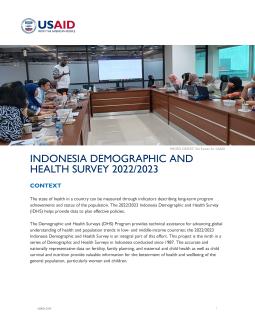Context
The state of health in a country can be measured through indicators describing long-term program achievements and status of the population. The 2022/2023 Indonesia Demographic and Health Survey (IDHS) helps provide data to plan effective policies.
The Demographic and Health Surveys (DHS) Program provides technical assistance for advancing global understanding of health and population trends in low- and middle-income countries; the 2022/2023 Indonesia Demographic and Health Survey is an integral part of this effort. This project is the ninth in a series of Demographic and Health Surveys in Indonesia conducted since 1987. The accurate and nationally representative data on fertility, family planning, and maternal and child health as well as child survival and nutrition provide valuable information for the betterment of health and wellbeing of the general population, particularly women and children.
Indonesia Demographic and Health Survey (IDHS) 2022-2023
The 2022/2023 IDHS is a nationally representative survey designed to provide information on the demographic and health status of the population. It is part of the worldwide DHS Program. The survey is led by the National Agency for Research and Innovation (BRIN). The Government of Indonesia is funding local costs of the survey. ICF is providing technical assistance under the DHS Program, which is funded by the U.S. Agency for International Development (USAID).
The objective of the 2022/2023 IDHS is to provide up-to-date information on fertility levels, marriage, fertility preferences, awareness and use of family planning methods, breastfeeding practices, childhood mortality, maternal and child health, awareness and behaviors regarding HIV/AIDS, adolescent reproductive health, and other health issues. The information on the demographic and health status of the population is useful to design, implement, and evaluate health and social sector programs.
The 2022/2023 IDHS will take place in scientifically selected 50,000 households in all the provinces of Indonesia; about 60,000 women aged 15 to 49, 25,000 teenage boys aged 15 to 24, and about 15,000 married men aged 15 to 54 are to be interviewed.
Data Collection
The survey will use targeted questionnaires based on the DHS-8 standard questionnaires adapted for Indonesia. Data will be collected in late 2023 using a Computer-Assisted Personal Interviewing (CAPI) and data management system.
Results
The 2022/2023 IDHS will provide up-to-date information on demographic and health indicators, which will be disseminated at various levels. The Key Indicators Report (KIR) will be published within two months of completion of data collection. A more detailed final report and a summary report will be prepared, by BRIN and relevant ministries/agencies in close collaboration with ICF, within 10 months of completion of data collection and is anticipated to be released by September 2024.
Further, the ICF dissemination team will provide technical support for preparing the dissemination materials to be presented in the national seminar and the provincial level seminar. The data of the survey will be published in the websites of BRIN and the DHS program for use by global audiences.
Contact
Desy Sagala, USAID at dsagala@usaid.gov
Anjushree Pradhan, ICF at anjushree.pradhan@icf.com


